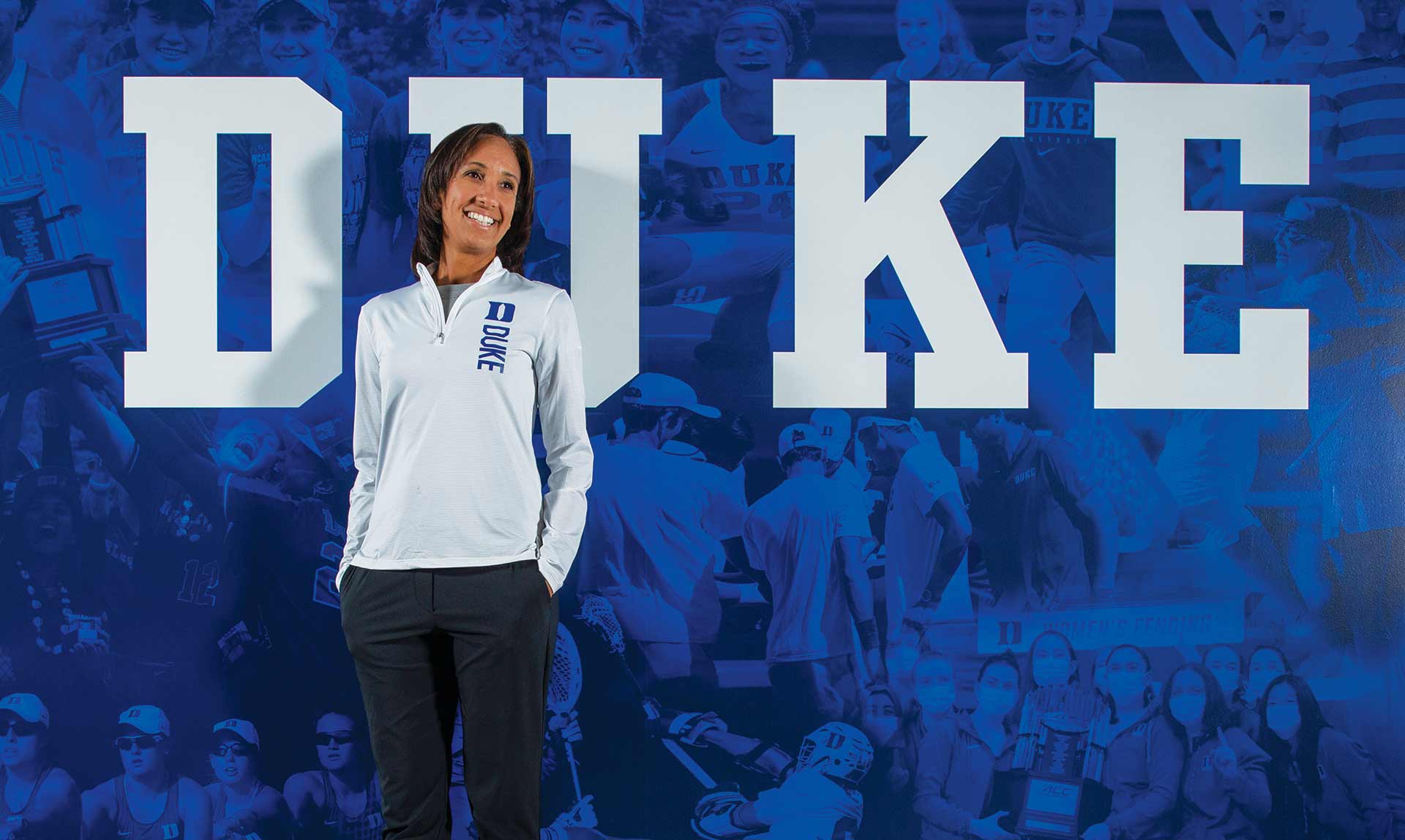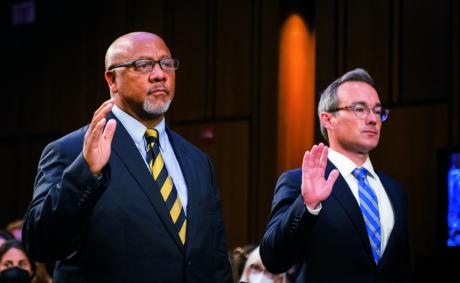Men were talking.
Nina King doesn’t name names, but she recounts the time she was on a football panel with a legendary coach and administrator, and the conversation had derailed in a tired direction: Women can’t do football. Women can’t coach football. Women can’t oversee football. Time out, she interrupted. I know you’re all legends, but I don’t have to design plays or run drills to maintain a student athlete program. Besides, she quipped, if the administrators are coaching, we’re in trouble.
“That’s kind of the perception and probably a little bit of the reality of why women are not hired as athletic directors at big-time schools,” King says.
“It’s seen as women can’t do football,” she continues. “Well, what the hell does that mean? Of course women can do football and lacrosse and soccer and rowing.”
Candid, fearless even, King takes on from her office as – ahem – Duke’s director of athletics. A wall of windows commands a bird’s eye view of the Krzyzewskiville lawn as she takes her place among legends. There’s a desk along one wall, a circle of chairs for easy chats and a conference table for serious business. The most conspicuous King touch: a treadmill, which sees plenty of use.
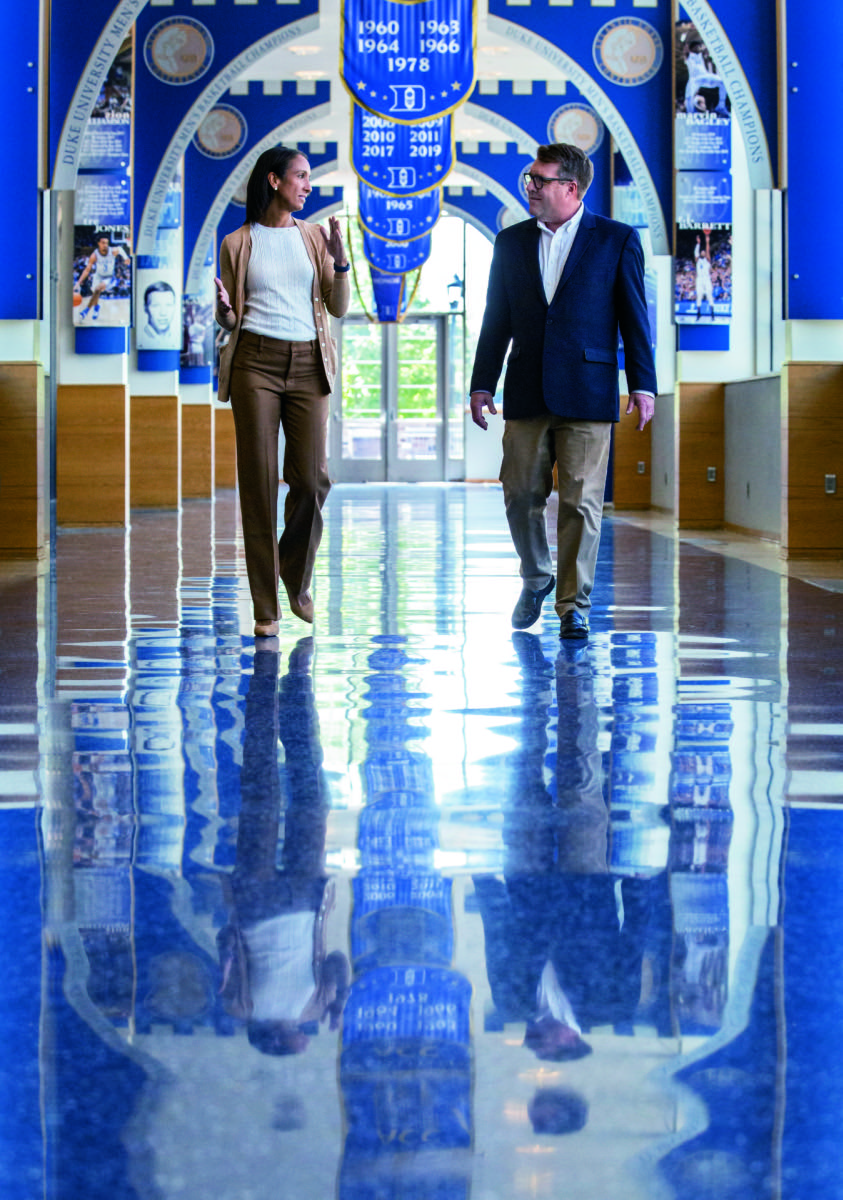
King owns the space – level, confident and evidently right at home in the big chair just two years into the role. She navigates the directorship in professional attire, sweats and running shoes, T-shirts – whatever fits the time of day. And she’s here all day. King is the first Black woman to hold the position, and she is an athletic director with a law background who came to athletics through team management. According to predecessor Kevin White, who was athletic director from 2008 until his 2021 retirement, King is a major upgrade, a contemporary leader for this moment in college athletics and American higher education. According to the people in King’s orbit, she’s the smartest person in the room – any room.
“When Vince Price offered her the role, I was euphoric. This was a great best-case scenario for Duke University, Duke Athletics and, quite frankly, college athletics.”
- Kevin White, retired Duke Athletics Director
Yet the magic of Nina King is that she shrugs off any implication that she’s a big deal. In conversation, she puts up no barriers. She cracks jokes, vents and curses and is just as quick to ask about your family, your kids and career, or where you grew up, as she is to talk about her big-deal role. She is totally present, following even the most scattershot conversation while jokingly attributing her undeniable attentiveness to caffeine. And she leads Duke Athletics, with 27 teams and hundreds of student athletes, without sacrificing her family time, personality or sheer enjoyment of sports.
“Sure, there are things to worry about and anxiety-inducing issues, but at the end of the day, it’s fun,” King says. “The student athletes keep us going and keep us young.”
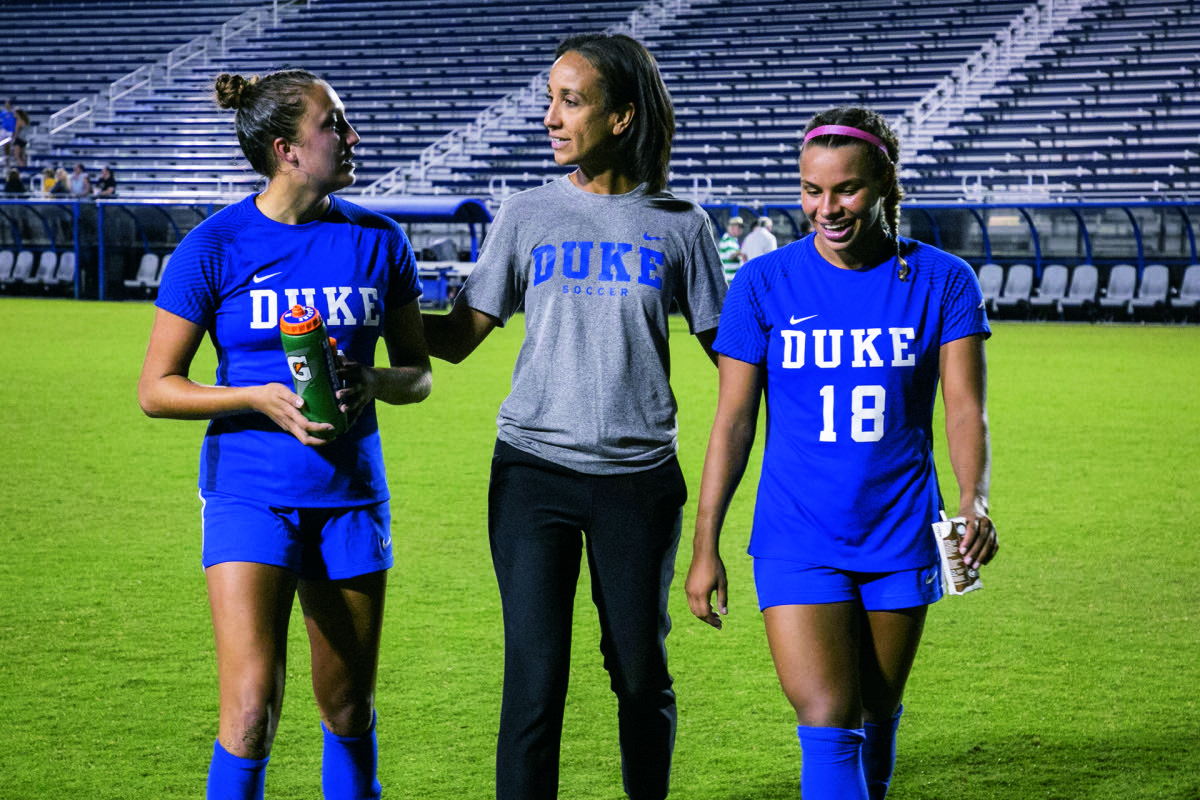
King, 44, grew up in Tampa, in a house with her mother, Lucy Stephan, and briefly, an aunt. She wore pigtails and bows to church on Sundays and spent many a late night at ballet class.
King started off in Montessori school. Her mom was always working, so she grew up fast and she grew up nerdy – it was all that time alone, she says. She read constantly – Nancy Drew, The Baby-Sitters Club, anything from a series so she could just finish one book and start the next. Nothing beat the first day of school, with its new textbooks and supplies.
A close family friend was a lawyer, which piqued her interest – both watching him work and, she admits, observing his trial when he got in trouble himself.
By the time she made it to Notre Dame as an undergrad, she had decided to be a lawyer.
While King was at Notre Dame, though, she got involved as a manager of the women’s swimming and diving program. She was so hooked that when she applied to law school at Tulane, she also applied for an internship at the NCAA. She landed both, deferred law school, and spent a year at the NCAA. By the time she arrived at Tulane, she knew she wanted her J.D., but not to practice law.
“I wanted college sports,” she says.
King met future husband Rick King in 2003, during her second year of law school. She jokes that she didn’t chase top grades or spend all her time in the library. Rick remembers a capable, thoughtful person who got the most out of New Orleans.
“I turned my ankle once at the basketball courts down in Napoleon and Magazine in New Orleans, and I hobbled the five blocks back to my apartment,” Rick reminisces. He called Nina to say he had to ice his ankle – no hitting the town for him. Twenty minutes later, she appeared at his door.
“She goes, ‘I’m going out, but here’s a burrito,’” he recalls. “She brought me dinner. That was sweet.”

After she finished at Tulane, King met Notre Dame athletics director Kevin White, who was immediately impressed and hired her as his assistant. “She looked a heck of a lot younger than 21 or 2, or whatever she was at that point,” White says. “Here we are 22 years later, and she was the right one at every turn and for all the right reasons.”
Indeed, King worked at Notre Dame with White until 2008, when Duke hired both of them. Upon White’s 2021 retirement she was selected to succeed him.
“I didn’t appoint her. I did not have the capacity to do that,” White says. “When Vince Price offered her the role, I was euphoric. This was a great best-case scenario for Duke University, Duke Athletics and, quite frankly, college athletics.”
Indeed, King knows Duke inside and out, but her impact is much broader than just Blue Devil sports. For two years she chaired the NCAA Women’s Basketball Committee. Lynn Holzman, vice president for NCAA women’s basketball, has known King since she was an NCAA intern. As Women’s Basketball Committee chair, Holzman saw in King someone who could view issues from multiple perspectives simultaneously and at will – chairperson, ACC representative, athletic director. Indeed, Holzman adds, King was key in addressing a major equity issue between men’s and women’s basketball during the 2021 tournament.
Nina became athletic director at a wild time: College athletics were still destabilized by COVID-19 and “name image likeness” (NIL) changes meant college athletes could now accept compensation. The threat of conference realignment regularly reared its head, while Duke-specific curveballs included letting a football coach go, hiring another and selecting Coach K’s successor.
“She’s responsible for giving me the best phone call I’ve ever received in my entire life,” says men’s basketball coach Jon Scheyer ’10. “I follow her lead with how she’s handled [leadership] with grace, with humility, and also with confidence. That’s a hard needle to thread.”
It’s a big job, says White. Simply put, an athletic director can’t get tired.

White knows the demands. Retired and surrounded by memorabilia in his home office – here a signed sneaker, there a line of Final Four courtside chairs – he paints a picture of an intense, unremitting career. White was up early, preparing for this conversation – he wants to do right by King. He didn’t let himself get tired, but she stares fatigue down. It’s the only way to face the things that keep an AD up at night.
“What is [college athletics] going to look like next year, five years, 10 years in the future? [I’m] hoping and praying we don’t stray too far from our educational-athletic mission,” King says, her usual light demeanor clouding. “When you look at college athletics as a whole running away to the money, it’s kind of scary.”
Duke will be OK, she says. The stress comes from navigating these changes without compromising the balance between academic and athletic excellence, which is a major point of pride for King.
The other is pushing Duke athletics to higher heights. “We were 21st in the [National Association of Collegiate Directors of Athletics] Directors’ Cup last year, which is kind of the national award cup given for sports success,” she says. “To me, 21st for Duke is not good enough.”
The work is done team by team, across 27 sports.
“We want to be one of the best [women’s basketball] programs in the country. When I came here, we were not that,” says women’s basketball coach Kara Lawson. “To be amongst the elite in a sport, you can’t be a one-hit wonder. You can’t be good for two years or three years.”
King was still deputy athletic director in 2020, when Lawson was hired, but her goal then and now was to have the best candidate coaching the women’s basketball team. Lawson – Olympic gold medalist and former Boston Celtics assistant coach – is that, King says. Plus, Duke has a diverse student athlete population, she says, and it makes sense to have a diverse staff, too. It’s no secret, King notes, that there is work to be done on this front – not just in terms of having a Black athletic director or women’s basketball coach, but throughout the organization. This does not mean kicking out people who are already in roles, King says, but reorganizing and restructuring to create opportunities.
“I want to be an administrator one day,” says Jarett Gerald who, as associate director of administrative operations, is King’s right hand. “To see how she interacts with people, see how she dresses, see what her personality is like, what’s the personality of somebody that’s at the highest of the highs? Oh, and they’re also a woman, they’re also a person of color. You can’t beat that.”
Today, Gerald can laugh about his comically bad luck the day of his job interview. Everything went spectacularly wrong, he says. Yet the moment he met King face-to-face, the disastrous first half of the day evaporated into immediate calm.
“It really did feel like a place that I could be and a person I could work with,” he says from an easy chair in King’s office, which she loaned him for our conversation. He has a front seat to a massive athletics operation, learning by observing how King takes it all on and makes it look easy.
The experience of student athletes is her priority. With her education and skills, King could run a traditional corporation, but she would get bored. Sure, Duke Athletics is a $100 million-plus business, but she doesn’t wear the CEO hat around Blue Devil athletes. She feels more like a team mom.
“It’s kind of like I have 775 kids plus two more,” she says.
Her sons Connor and Austin, who were 11 and 9 as this magazine went to print, are fixtures at games. The AD role is a lifestyle, White knows. His own children grew up attending college games, just like King’s boys. Today, four of White’s five children work in the field.
“They grew up in aquatic centers, in gyms and tracks and football stadiums,” he says.
Yet White was a white man in a role historically dominated by white men. As a Black woman, King is direct with her sons about the importance of representation, of opening doors, of the “If you can see her, you can be her” mantra.
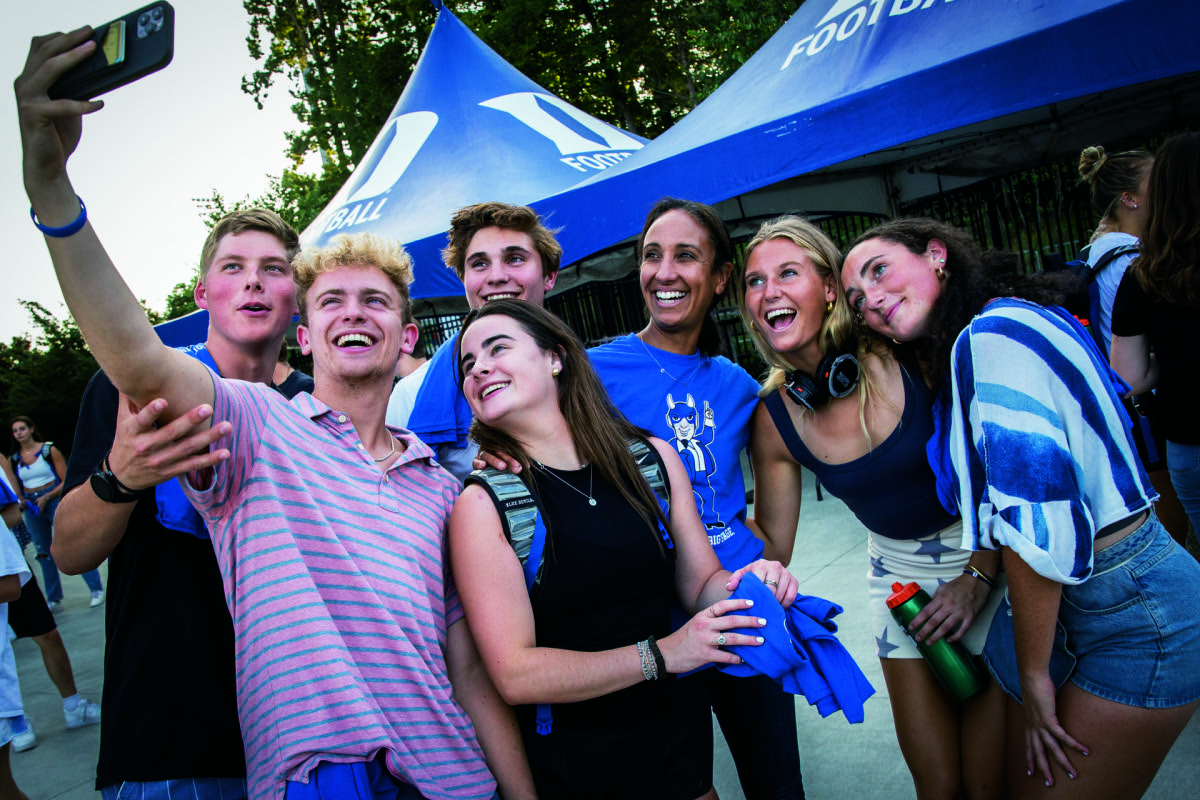
“They understand how rare it is that I’m doing this role,” Nina says. “It’s charting the path for – and I keep saying this out loud and I truly believe it – for women and people of color not to come behind me, because we don’t have time for that. I’m not that old. [I want them] to come with me down this path.”
Darby Nevola, associate director of Iron Dukes, the fundraising arm for Duke Athletics, is walking the path. Previously she was White’s assistant and worked closely with King, who inspired Nevola as a parent, a professional and a mentor.
“She comes at you like, ‘I’m just a normal human,’” Nevola says. “She doesn’t understand how much of a role model she is.”
Gerald also is walking the path. His childhood dream was to manage the L.A. Lakers. Today his goal is to be an athletics administrator, and he is learning directly from the best. On his own initiative, he clocks in before King does and leaves as late as she leaves. Like King, Gerald has been an NCAA intern.
“She comes at you like, ‘I’m just a normal human.’ She doesn’t understand how much of a role model she is.”-
- Darby Nevola, associate director, Iron Dukes
“[She] started where I am and made it there, somewhere that I aspire to be,” he says.
King’s family walks the path, too. For them, though, it’s life. It’s as much about seeing Mom on TV as it is about what time is dinner tonight? And dinner, husband Rick says, is their family anchor. King is organized, and so is the family calendar. Rick has his “honey-do” list. Stephan, Nina’s mom, has lived with the Kings since 2010 and regularly keeps the boys. They make it work.
“We’re only one year into this,” Rick said in summer ’22. Already, though, the family had found a rhythm of meeting for dinner at a time that fit King’s sometimes bonkers schedule. They would eat at a soccer game, say, or late in the evening. “If we can get dinner planned, that’s our normalcy,” Rick says.
Beyond that, athletics is family – authentically and genuinely. After working closely with White for more than two decades, King is on the White family text chain. “Nina has sibling relationships with all their kids – you know, siblings she never had,” says Rick. The Kings do Christmas with the Whites – Nana and Pop, as the King boys call them.
And if King needs to call White, she can, but it doesn’t go the other way. White never calls her with unsolicited advice, King says. He knows, like she knows, that she has the support, the ability, the experience and the energy to lead – equal parts team mom and power CEO, cracking jokes and staring down fatigue. “I’m just looking forward to settling,” King says and pauses, thinking fast because she only thinks fast. Settle can mean settle for less, which is outside of her nature – nowhere near it. No, settle can also mean settle into a comfortable role, one that feels so right that it could have been made for her. “Not settling in a bad way,” she continues half a beat later, “but just kind of, ‘All right. We got this.’”
